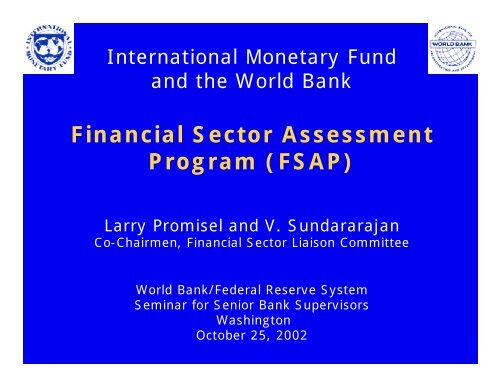
Financial Sector Assessment Program (FSAP) – Technical Note on Monitoring and Disclosure of Climate-Related Risks The Financial Sector Assessment Program (FSAP) is a collaborative effort between the International Monetary Fund (IMF) and the World Bank to assess the financial sector stability and development needs of member countries. In recent years, the FSAP has incorporated an assessment of climate-related financial risks as part of its standard financial stability reviews. The technical note on “Monitoring and Disclosure of Climate-Related Risks” provides guidance to countries on how to develop and implement effective monitoring and disclosure frameworks for climate-related risks. These frameworks are essential for financial institutions to identify, measure, and manage climate-related financial risks and for investors and policymakers to make informed decisions. Key Elements of the Technical Note: Definitions of Climate-Related Risks: The technical note provides clear definitions of climate-related risks, including physical risks (e.g., extreme weather events) and transition risks (e.g., changes in energy and transportation policies). Supervisory Guidance for Financial Institutions: The note outlines supervisory expectations for financial institutions to assess, monitor, and disclose climate-related risks. This includes guidelines on: * Risk identification and measurement * Integration of climate-related risks into governance and risk management frameworks * Data collection and reporting Disclosure Framework for Financial Institutions: The technical note emphasizes the importance of standardized and transparent disclosure of climate-related risks. It recommends that countries adopt disclosure frameworks consistent with international standards, such as the Task Force on Climate-Related Financial Disclosures (TCFD) recommendations. Role of Public Authorities: The technical note acknowledges the role of public authorities in supporting the development and implementation of effective monitoring and disclosure frameworks. This includes: * Setting regulatory expectations and providing guidance * Facilitating data sharing and standardization * Promoting capacity building and awareness Benefits of Monitoring and Disclosure: The technical note highlights the benefits of effective monitoring and disclosure of climate-related risks, including: * Improved risk management and resilience * Enhanced financial stability * Facilitated access to capital for low-carbon investments * Reduced systemic risks Conclusion: The FSAP technical note on “Monitoring and Disclosure of Climate-Related Risks” is a valuable resource for countries seeking to strengthen their financial systems and address climate-related financial risks. By implementing the recommendations outlined in the note, countries can ensure that financial institutions have the necessary tools and guidance to identify, measure, and manage these risks, ultimately contributing to a more resilient and sustainable financial system.Title: Kingdom of the Netherlands-Netherlands: Financial Sector Assessment Program – Technical Note on Monitoring and Disclosure of Climate-Related RisksTitle: Kingdom of the Netherlands-Netherlands: Financial Sector Assessment Program – Technical Note on Monitoring and Disclosure of Climate-Related Risks Publication Date: June 18, 2024 Author: International Monetary Fund Summary: This technical note assesses the current state of monitoring and disclosure of climate-related risks by Dutch financial institutions. It provides an overview of the risks faced by the Dutch financial sector and the measures taken by the authorities to address these risks. Key Findings: * Dutch financial institutions are exposed to both physical and transition risks from climate change. * The Dutch authorities have made progress in identifying and analyzing climate-related risks, and have implemented a range of policies to mitigate and adapt to these risks. * However, there are still some areas where improvements can be made, particularly in relation to disclosure of climate-related risks by financial institutions. Recommendations: The IMF recommends that the Dutch authorities continue to strengthen their efforts to monitor and disclose climate-related risks by financial institutions. This includes: * Encouraging financial institutions to adopt more comprehensive and standardized approaches to climate-related risk disclosure. * Developing a central repository for climate-related risk data. * Raising awareness among financial institutions and investors about the importance of climate-related risk disclosure.
Financial regulators around the world are increasingly focused on climate-related financial risks. In response, the Financial Sector Assessment Program (FSAP) has developed a new technical note on monitoring and disclosure of climate-related risks. The note provides guidance to financial institutions on how to identify, assess, and manage climate-related risks. It also includes recommendations on how to disclose these risks to investors and other stakeholders. The FSAP technical note is an important step forward in the development of a global framework for climate-related financial risk management. It is expected to help financial institutions to better understand and manage these risks, and to improve the transparency of climate-related risks in the financial system. The FSAP technical note is available on the IMF website.
Financial Sector Assessment Program (FSAP) – Technical Note on Monitoring and Disclosure of Climate-Related Risks
Related Posts
Kate Hudson Recreated Her Iconic How to Lose a Guy in 10 Days Scene During the World Series, and I Can’t Ignore the Fans’ Reaction to It
Kate Hudson isn’t just an award-winning one actress with famous parents; she is also a huge baseball fan. So it’s no surprise that she attended this year’s World Series to…
Software Catalog Unveils Array of Cutting-Edge Solutions for Enterprise Transformation
Software Catalog Unveils Array of Cutting-Edge Solutions for Enterprise TransformationSoftware Catalog Unveils Array of Cutting-Edge Solutions for Enterprise Transformation Technology is rapidly reshaping the business landscape, making it imperative for…